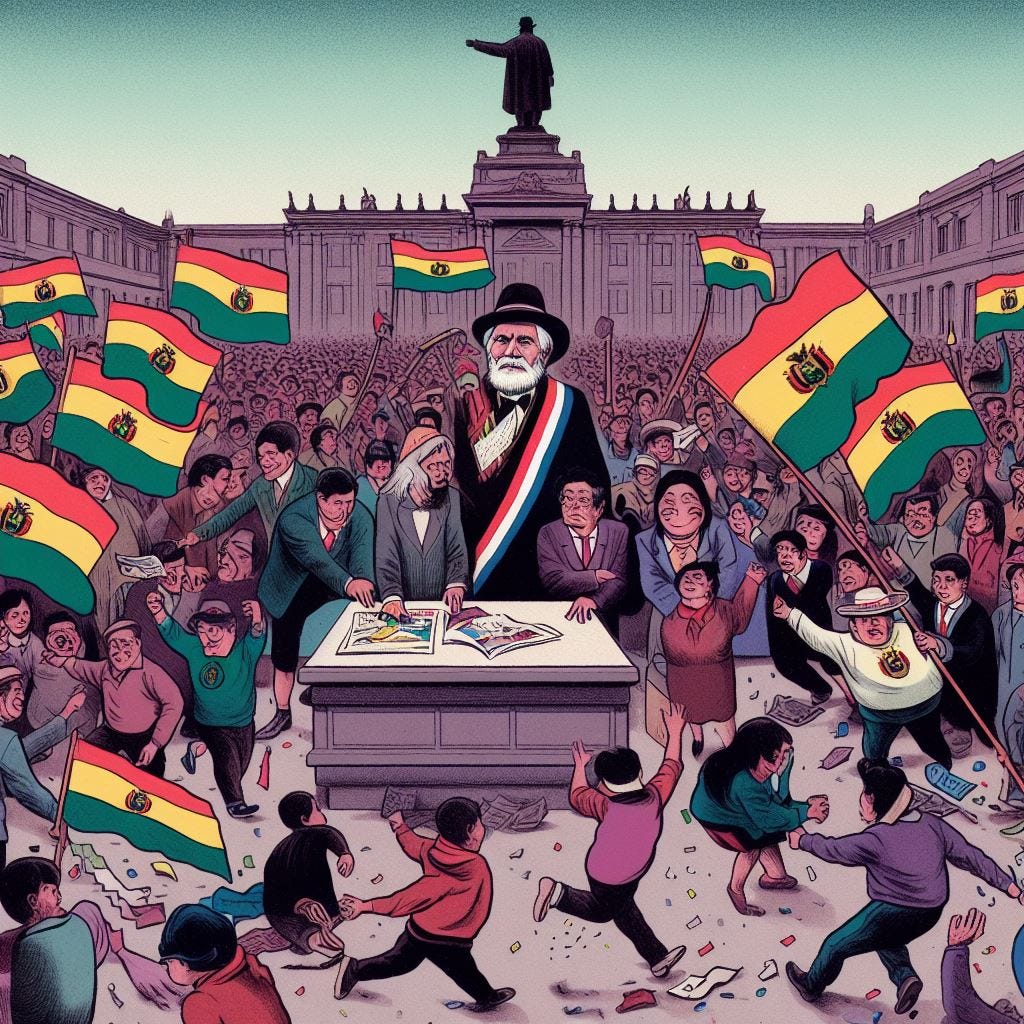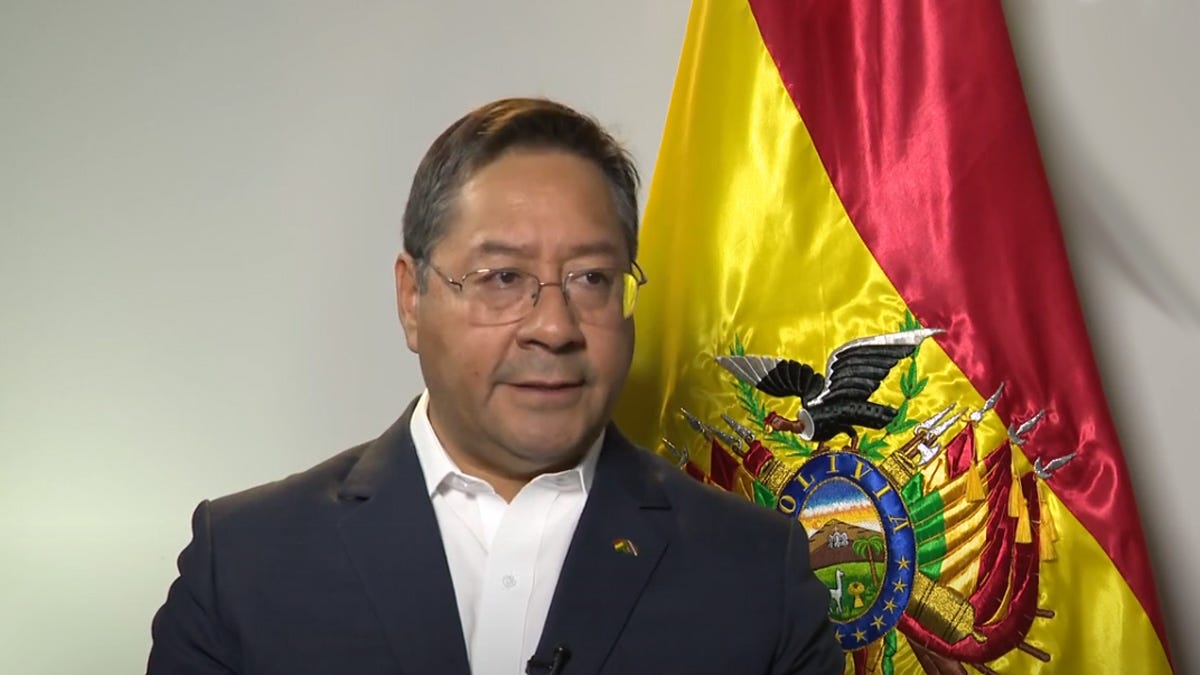Evo has split the party he led for years in Bolivia
President Arce's ejection from MAS, and a Morales candidacy illustrate deep schisms within the left-wing party
This week’s feature is by Jordan Cooper, an academic in Bolivia
The announcement by former Bolivian President Evo Morales on Sep 24 that he will stand in the South American country’s elections in 2025 illustrates a deep schism among Bolivia’s ruling party MAS. The party has seen growing infighting between factions who support current president Luis Arce Catacora, and Morales supporters.
The rivalry culminated in Arce’s expulsion from MAS last week, but this may be merely the beginning of a rivalry among the left that will extend well into the election season.
The full name of the MAS is the MAS-IPSP (Movement towards Socialism-Instrument for the Political Sovereignty of the People). At least in theory, it is not so much a political party as the political instrument of the social movements which founded it and make up its base.
No political party in Bolivian history has ever been larger, won more votes, or held power for longer. Yet even as it still controls the presidency and the legislature, it finds its unity threatened and its ability to govern in decline as the Morales wing of MAS blocks every piece of legislation proposed by Arce supporters in Congress. What happened?
With the exception of Jeanine Añez’s de facto transitional government in 2019-2020, the MAS has controlled the Bolivian presidency since 2005, first under Evo Morales and now under Luis Arce. Its internal divisions have been festering for some time, starting with the coup of 2019.
Morales, an Indigenous former coca farmer who led Bolivia for nearly 14 years, departed office under a cloud in November 2019 after he ran for an unprecedented fourth term in an election marred by allegations of fraud and later a right-wing coup to remove him from office. The de facto government formed thereafter under Jeanine Añez would proceed to massacre unarmed protesters in Senkata and Sacaba.
His return to the country in 2020 after the landslide victory of Arce— a MAS candidate and former ally— prompted celebrations from MAS supporters.
But almost immediately, fissures began to develop in the coalition. And economic crisis' in Bolivia this year have left the country’s foreign exchange, gold, and natural gas reserves all nearly empty, and exacerbated infighting
Arce, the current president of Bolivia, rose to prominence as the Minister of the Economy during Evo Morales’s 14 years in office. In this role, he was often credited by Morales as being the brains behind the MAS’s “Social, Communitarian, Productive” economic program.
Recently, however, Morales has said that Arce was little more than a “cashier”, implying that he had no real influence in the creation of policy.
Evo has gone on the offensive against Arce, criticizing every aspect of his presidency as well as his tenure as economic minister as he tries to position himself as the candidate who will bring back economic growth to Bolivia.
Ironically, Arce owes his presidency to Evo, who handpicked him as the party’s 2020 candidate despite the organizations in the Pact of Unity (a coalition of five of Bolivia’s largest social movement organizations) wanting David Choquehuanca to be the presidential candidate.
While Arce attempted to assert his independence from Morales, Evo retained control of the MAS party as its formal leader and continued picking candidates. Increasing tensions were dramatically illustrated in December 2020 when a MAS delegate launched a plastic chair at the ex-president during a party meeting in Laucha, Cochabamba.
The recent party congress of the MAS-IPSP, held in Lauca Ñ from October 3-5, saw Evo Morales officially declared as the party’s candidate for the 2025 elections. The informal political divide was also made official as President Arce and vice-president David Choquehuanca were formally expelled from the party.
Evo has said the pair “expelled themselves” by not attending the congress. Arce defended his decision not to attend by pointing to the Pact of Unity’s criticisms that the congress included fewer spots for leaders of the social movements who founded the party, saying “It is very difficult for us to attend a congress where the owners [of the party] are not going to be there...It is clear, they are questioning a congress where they no longer have representation.”
The organizations that comprise the Pact of Unity—the Single Trade Union Confederation of Peasant Workers of Bolivia (CSUTCB), the Trade Union Confederation of Intercultural Communities Originating from Bolivia (CSCIOB), the Confederation of Indigenous Peasant Women Originating from Bolivia 'Bartolinas Sisa', the Confederation of Indigenous Peoples of Bolivia (CIDOB) and the National Council of Ayllus and Markas of Qullasuyu (CONAMAQ)— chose not to attend and/or divided into pro-Arce and pro-Morales factions.
The CSUTCB’s congress the month before in El Alto was marked by occasionally violent confrontations between the two sides which saw the police tear gas the event. By its conclusion, two different directors of the organization had been proclaimed, one supported by Arce and the other by Morales.
Social organization Bartolinas concluded in their statement before the event that they would not attend, because, “we remain unified and will not allow divisions or fractures within our organization and even more so within the Political Instrument for the Sovereignty of the People (MAS-IPSP) because it has cost lives and we will work for the unity of the people”
The MAS is irreparably broken, which sets the stage for very uncertain and conflictive presidential elections in 2025. With Evo Morales as the candidate of the MAS, Arce will be running for re-election under the banner of a party yet to be determined.
What remains to be seen is who, if anyone, will consolidate support as a right-wing opposition candidate. Carlos Mesa has already lost to both Evo (in 2019) and Arce (in 2020), and Luis Fernando Camacho (the governor of Santa Cruz) has been in prison since December after being arrested for, according to the Bolivian government, his role in the 2019 coup. Thus, it appears as though the main battle in this election will be between Morales and Arce; although the MAS is broken, the hegemony of the left in Bolivia arguably is not. Indeed, Morales and Arce may end up in a runoff election in 2025 as the two most well-known candidates. Previous left-wing fissures in Bolivia have led one of the two camps to shift to the right. Will that be the case this time?
The Big Headlines in LATAM
Seems like the entire world, understandably, has its eyes on Israel and Palestine at the moment. We aren’t experts on that region, don’t speak the languages, and have never even been there, so we’ll leave the coverage to those brave journos on the ground in the region. We recommend you get your news directly from them and not blue checks on the app formerly known as Twitter, which has been utterly swamped with disinformation and misinformation.
But, South America has some big elections coming up in the next few weeks that are worth watching!
Ecuador goes to the polls Sunday in snap elections organized after former president Lasso dissolved the government and resigned from office. The campaign has been brutal, and bloody— with one candidate murdered and ongoing battles in the criminal underworld. Whoever wins will serve just 16 months, finishing the term to which Lasso was elected.
Colombia holds regional elections on October 28, which will determine mayoral and gubernatorial candidates in an election season that has also been plagued by violence, as we covered two weeks ago. The ruling party of President Gustavo Petro, Pacto Historico is expected to suffer moderate losses, at least according to polls.
Petro’s approval rating has slipped in recent months amidst inflation, political scandals, and setbacks in his “Total Peace” plan for the country which involves negotiating directly with armed groups in return for their disarmament.
Ship’s Business
Joshua has been slaving away on the launch for a Spanish-language PWS newsletter, which we hope to launch this month. We’re excited! Rather than mixing English and Spanish language posts on the website, we decided readers would be better served by dedicated newsletters in each language.
And we’ve also been working on every pirate’s favorite thing: booty! YARRRR!!!! Although still in Beta testing, we have PWS swag! It’s hosted temporarily on Etsy as we build out a dedicated store on the website. Go take a look! Now you can support indie journalism in style!
We hope to have things smoothed out for the full launch on the website soon.


Spanish Word of the Week
Chamba: Chamba is what every freelancer spends half their waking hours looking for: work.
We heard an interesting story about the origin of the word this week, which we can’t at all confirm. In the early 20th Century migrant workers in Mexico often worked in the US as agricultural laborers via official programs encouraged by the US Chamber of Commerce.
As the practice grew more widespread, Spanish speaking workers often referred to it with the Spanish pronunciation (Ch-AHm-ber), until eventually simply pronouncing it “chamba”. Nowadays, the term is used throughout most of Latin America to mean “a job”.
We found a Capybara who needs Chamba. Give him Chamba
Boy do we love capys. As always, thanks for reading, piratas! Hasta Pronto!





Is the Bolivian split only about ego for power or is there a difference on a fundamental issue that would affect the health of the People?